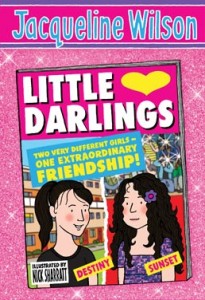 My little sister has recently discovered the joys of reading. On a recent holiday it was only her new-found habit that gave us respite from ‘can we go crab fishing/to the beach/have an ice cream?’, so I am very grateful for this. It should give her years of pleasure, and help her in school immeasurably. But there is just one problem with this. She refuses to read anything that isn’t by Jacqueline Wilson.
My little sister has recently discovered the joys of reading. On a recent holiday it was only her new-found habit that gave us respite from ‘can we go crab fishing/to the beach/have an ice cream?’, so I am very grateful for this. It should give her years of pleasure, and help her in school immeasurably. But there is just one problem with this. She refuses to read anything that isn’t by Jacqueline Wilson.
Don’t get me wrong, I love Jacqueline Wilson as much as the next girl. I was at my most Wilson-obsessed at about my sister’s age (nine), reading The Suitcase Kid about five times in a row at one point. But I didn’t read Wilson exclusively. There was some Alice Through the Looking Glass, Goosebumps and Little Women to accompany The Suitcase Kid. Fourteen years later, neither threats nor bribery can convince my sister to read anything else. Not even the promise of crab fishing moved her.
So I am understandably concerned that my little sister is getting an incredibly limited literary diet. Some of Wilson’s books are brilliant, but as with any prolific author, some of the themes and characters tend to blur into one another somewhat. Unfortunately, Little Darlings falls into the latter category. A standard Wilson tale in which the children are more mature than the parents, and are either neglected or function as the parent themselves.
Destiny and Sunset are two girls from very different backgrounds. Whilst Destiny lives on a council estate with her single mother in the North of England, Sunset is the daughter of a rock star and a model whose days are filled with photo shoots for trashy magazines and playing with the nanny. They forge an unlikely friendship, and the book focuses on its development and their attempts to sort out their very different family problems. Destiny is worried as her mum is losing lots of weight and seems very weak all the time, whilst Sunset cannot get either of her parents to behave like adults – especially when her Dad leaves them all for another woman…
The book takes up the themes of most of Wilson’s work – children looking after parents, broken homes, poverty, feeling isolated etc – and adds an OK magazine lifestyle. Its messages are staid and predictable: Destiny’s family is poor but rich in happiness, Sunset’s family is rich and yet fractured. That both girls could have the same father is an interesting plot device, as it not only provides a tangible link between the two girls, but also makes difficult reading for an adult. Destiny’s mother is childlike, believing that Mickey (ostensibly Destiny’s father) will rescue them from the poverty they live in and be a parent to Destiny. At first Destiny buys into the fantasy too; it is heartbreaking to witness her gradual realisation that Mickey will never want anything to do with them, and comfort her mother. And it is this plot device that leads to the most shocking element of the novel.
SPOILER ALERT
It is impossible to discuss this novel without mentioning the ending. All through the novel Mickey wants nothing to do with Destiny or her mother. They are swept aside, and Sunset gets in trouble for even mentioning them. But when Mickey’s agent accidentally learns of Destiny’s talent for singing, she is invited to take part in a reality television show where celebrity parents show off their talented offspring in order to help revive Mickey’s flagging career. The novel ends with Destiny, her mother and Sunset all happily preparing for the show, overjoyed that all their dreams have come true: Sunset has a true friend in Destiny, Destiny’s talent has been realised, and Destiny’s mother has the promise of no longer living in poverty. As an adult reader, however, I found it deeply disturbing. It is painfully obvious that Destiny is being exploited and that Mickey only wants to know her out of self-interest, and yet it is presented as a ‘happy ending’. It is either a rare cynical ending to a Wilson tale, or a startling departure from her usual morality. The child characters – and perhaps child reader – end the book thinking that it is great the family are finally united, which I find problematic considering the evident exploitation of the child. Perhaps I am underestimating the capacity of child readers to recognise this element that is never explicitly stated; I shall have to ask my sister when she finishes the book.
Overall, Little Darlings feels like a hotchpotch of other Wilson novels, with celebrity thrown in. But the ending reveals a rare darkness in Wilson’s work, setting it apart from the rest of the canon.
By Lauren

